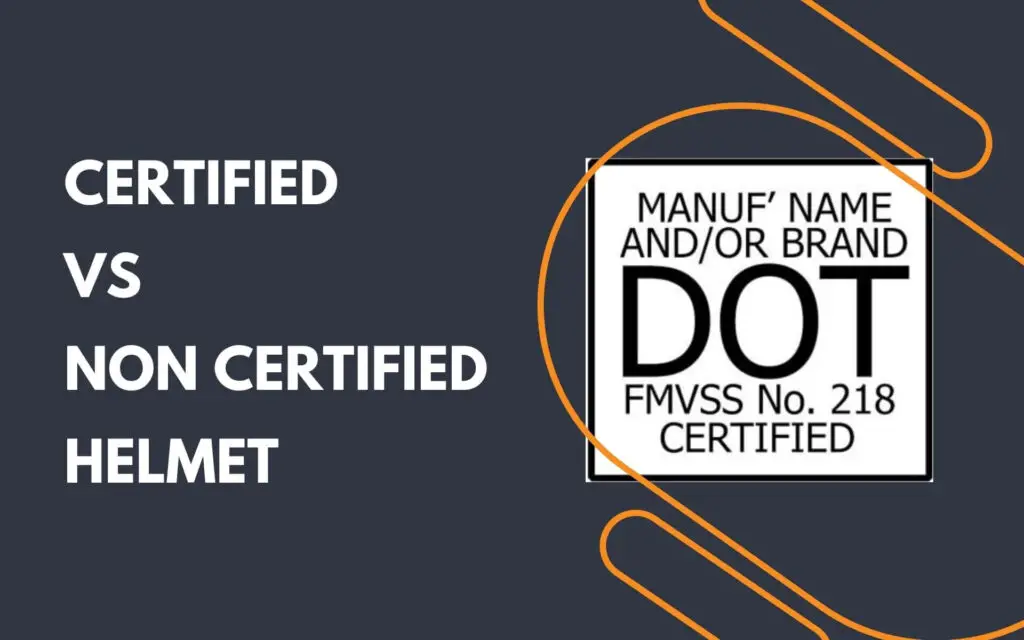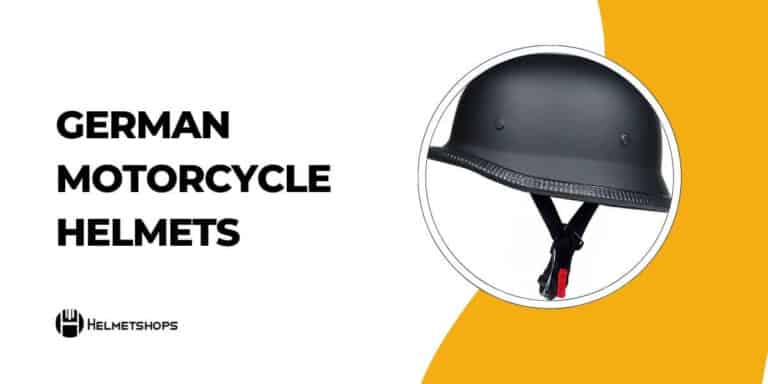Disclosure: As an Amazon Associate We earn from qualifying purchases.
A certified helmet adheres to safety standards while a non-certified helmet may not. Certified helmets provide better protection to the head and are recommended for use.
Wearing a helmet while riding a motorcycle, bicycle, or engaging in any other activity that requires head protection is crucial for safety. However, not all helmets provide the same level of protection. Certified helmets are tested and approved to ensure they meet safety standards, while non-certified helmets may not provide the same level of protection.
This article delves into the disparities between certified and non-certified helmets, emphasizes the significance of donning a certified helmet, and examines the potential hazards associated with wearing a non-certified helmet.

Importance Of Choosing The Right Helmet
The Dangers Of Wearing Inadequate Head Protection
Your head is the most valuable part of your body, and protecting it should always be a top priority. Inadequate head protection can result in severe injuries, including concussions, brain damage, and even death. It is essential to understand that not all helmets are created equal, and you must choose the right helmet based on your intended activities.
- Wearing an inadequate helmet can cause traumatic brain injuries.
- Helmets do not prevent all injuries, but they significantly reduce the severity of injuries.
- A properly fitting helmet can reduce the risk of injuries by up to 85%.
Increase In Helmet-Related Injuries
The number of head injuries and fatalities caused by inadequate helmets has increased in recent years. In fact, non-certified helmets have become a significant cause of concern for safety regulators worldwide. Helmets that do not meet safety standards can be comfortable, affordable, and stylish, but they cannot provide adequate protection.
- An increase in helmet-related injuries is mainly due to the use of non-certified helmets.
- Non-certified helmets may also void insurance policies and decrease chances of receiving compensation.
- Non-certified helmets are cheaper but sacrificing safety for price is not worth it.
Understanding The Importance Of Certified Helmets
When participating in high-risk sports and activities, it’s important to wear certified helmets that meet strict safety standards. This way, you can have the utmost confidence knowing that you are adequately protected. Whether you are a professional athlete or a recreational rider, wearing a certified helmet is crucial to minimize the risk of serious head injuries.
- Certified helmets provide protection for a single high-impact accident.
- Helmets certified by trusted organizations such as the dot, ECE, and Snell are guaranteed to provide optimal protection.
- Certified helmets may be more expensive than non-certified helmets, but the extra cost is worth it for protective gear.
The importance of choosing the right helmet cannot be understated. When choosing a helmet, consider the activity you will engage in and always opt for a certified one. While helmets cannot guarantee total safety, they significantly decrease the severity of the injuries.
Remember, your safety is always top priority, so invest in the best helmet that suits you.
Understanding The Certification Process
What Makes A Certified Helmet Different From A Non-Certified One
Helmets play a crucial role in safeguarding our heads while we are travelling on two-wheelers. However, not all helmets are created equal. In the market, you can find both certified and non-certified helmets. It is essential to know the difference between the two types before investing in one.
Here are a few factors that distinguish them from each other:
- Materials: Certified helmets are made up of high-quality materials and adhere to strict safety standards during manufacturing. Non-certified helmets are generally made up of substandard materials and lack the necessary safety standards.
- Impact resistance: Certified helmets are designed to handle high impacts and protect the rider’s head from severe injuries. Non-certified helmets may not provide the same level of protection and can fail during an accident.
- Weight: Certified helmets are generally heavier than non-certified helmets due to their sturdy construction, whereas non-certified helmets use lightweight, substandard materials.
- Durability: Certified helmets are built to last, while non-certified helmets can crack or break easily during an accident.
The Testing Process For Certified Helmets
The certification process for helmets is a rigorous one and involves many tests to ensure that the helmet meets safety standards. Here are some of the tests a helmet undergoes to get certified:
- Impact absorption test: This test is performed to check the impact resistance of the helmet. The helmet is dropped multiple times from different heights onto different surfaces to assess its strength.
- Retention system: This test examines the helmets’ chin strap and its ability to keep the helmet in place during an accident or impact.
- Penetration test: This test involves dropping a pointed object onto the helmet to test if it can resist penetration. This test evaluates the helmet’s outer shell’s endurance capacity.
- Peripheral vision test: This test evaluates the field of vision the helmet provides to the rider and confirms that it is within the standard levels.
- Flammability test: The helmet is tested for its fire-resistance capacity by putting it into an ignited flame for a few seconds.
The Advantages Of Wearing A Certified Helmet
Wearing a certified helmet has many benefits. Here are the advantages of investing in a certified helmet:
- Improved safety: Certified helmets are made up of sturdy materials and are designed to meet strict safety standards, making them a safer option than non-certified helmets.
- Legal compliance: Wearing a certified helmet is mandatory in many countries. By wearing a certified helmet, you can ensure legal compliance and avoid fines or penalties.
- Comfort: Many certified helmets come with features like advanced ventilation systems, comfortable interiors, and noise-reducing technology, making them more comfortable to wear than non-certified helmets.
- Longevity: Certified helmets are durable and made to last, making them a long-term investment. They do not need to be replaced frequently.
When choosing a helmet, it is essential to do your research and invest in a certified helmet. Certified helmets go through rigorous tests to ensure they meet safety standards, providing riders with improved safety, comfort, and longevity.
The Cost Of Choosing Non-Certified Helmets
Certified Vs Non Certified Helmet
Helmets are an essential piece of protective gear when it comes to any outdoor activity, especially for motorcycle riders. Investing in a high-quality helmet could be the difference between life and death, and choosing the right type of helmet is crucial.
A certified helmet is designed to meet the safety standards set by regulatory bodies, which guarantee safety to the user. On the other hand, non-certified helmets are often cheaper, but their efficiency in protecting the user is questionable. Let’s take a closer look at the cost of choosing non-certified helmets.
The Shortcomings Of Non-Certified Helmets
Non-certified helmets lack the safety standards set by regulatory bodies, making them less reliable than certified helmets. Factors contributing to their inefficiency include the helmet’s material quality, inadequate padding inside the helmet, and the design’s compromise. Some of the things to consider with non-certified helmets include:
- Inconsistencies in helmet weight, making them either too heavy or too light
- Low-quality material in the helmet’s construction
- Non-regulated production processes, making the helmet’s design and construction faulty.
The Short-Term Vs Long-Term Costs Of Choosing Non-Certified Helmets
Purchasing non-certified helmets may seem cost-effective as they are sometimes cheaper than their certified counterparts. However, the price tag may hide long-term costs brought about by accidents and injuries. Consider these factors:
- Injuries incurred during accidents while wearing a non-certified helmet may bring about costly insurance charges.
- The hospital bills for treatment of injuries incurred during accidents in non-certified helmets may exceed the helmet’s purchase price.
The Risks Of Not Opting For A Certified Helmet
Choosing a non-certified helmet puts the user at significant risk of injury or death in a road accident. A certified helmet has rounded edges, thick protective foam, and a chin strap that keeps the helmet snug against the face. These features work together to provide sufficient protection from impact.
Non-certified helmets lack these features, and as a result, accidents can result in severe injuries to the head and neck. In some cases, they can even be fatal.
Choosing a non-certified helmet is never worth the risk. Investing in a certified helmet may come at a higher cost, but the cost of not choosing one could have long-lasting effects on the rider’s life. Always remember, a tested and certified helmet meets safety regulations, providing the best protection from head injuries.
Crazy Differences Between Non-Certified And Certified Helmets
Helmets are undoubtedly one of the most essential safety gears for a rider. Whether it be for a motorcycle, bicycle, or skateboarding, a helmet is a must-have item. One question that constantly pops up in mind is whether it’s important to have a certified helmet or not.
To put it simply, a non-certified helmet may cause more harm than good. Here are the notable differences between non-certified and certified helmets.
The Materials Used In Non-Certified Helmets Vs Certified Ones
The materials used in a non-certified helmet are often not appropriate to protect the rider’s head in case of a collision. Certified helmets must undergo rigorous tests to ensure that the materials used can withstand strong forces and provide maximum protection.
Some of the materials used in non-certified helmets are cheap, easily breakable, and may not be able to absorb shock.
The Comfort And Fit Differences Between Non-Certified And Certified Helmets
One crucial factor that can determine the efficacy of a helmet is comfort. A helmet that is too tight or too loose can cause discomfort, making it distract from the road ahead. Non-certified helmets may not have enough padding for comfort and protection. Certified helmets have gone through rigorous testing to ensure this.
Certified helmets have been designed to fit the rider’s head perfectly, providing optimal comfort while ensuring maximum safety.
The Impact Absorption Differences Between Non-Certified And Certified Helmets
The most significant difference between a non-certified and a certified helmet is their ability to absorb impact. In the event of an accident, a non-certified helmet may shatter completely, causing more harm to the rider’s head. The foam used in non-certified helmets is generally not made to withstand high-impact forces, which could result in traumatic head injuries.
On the other hand, certified helmets can absorb up to 300g of forces, ensuring that the rider’s head remains safe in case of a collision.
It is advisable to opt for a certified helmet over a non-certified one to ensure maximum protection. A certified helmet will offer comfort, durability, and most importantly, safety to the rider. So, it’s better to invest in a certified helmet and avoid the risk of a head injury in the event of an accident.
Making The Right Choice
Certified Vs Non-Certified Helmet: Making The Right Choice
The helmet is an essential gear to ensure motorcycle riders’ safety. Helmets not only protect you from head injuries but also save your life in a crash.
Factors To Consider When Choosing A Helmet
Choosing a helmet is not only about style. You need to consider several factors to make the right choice. Here are some of the things you should consider:
- Safety ratings: Check if the helmet has a dot (department of transportation), ece (economic commission for europe), or snell certification. Certifications guarantee that the helmet meets safety standards and can protect in accidents.
- Fit: A helmet’s fit can make a significant difference in protecting you from head injuries. Ensure that the helmet fits snugly and comfortably on your head. There should be no spaces between the helmet and your head.
- Ventilation: A well-ventilated helmet can keep you cool and comfortable while riding. Check for vents that allow air to flow through the helmet.
- Weight: A lightweight helmet can reduce neck strain and make your ride more comfortable.
How To Ensure You Are Purchasing A Certified Helmet
Many helmets are available in the market, but not all of them provide adequate protection. Here are some tips to ensure you are purchasing a certified helmet:
- Check the label: Look for the dot, ece, or snell certification label on the helmet. These certifications indicate that the helmet meets minimum safety standards.
- Verify the certification: Check with the respective certification authorities if you doubt the authenticity of the certification label.
- Purchase from a reputable dealer: Buy from a well-known dealer who sells certified helmets.
Importance Of Regularly Replacing Your Helmet
Helmets are not designed to last forever. They can degrade over time and lose their effectiveness in protecting your head from injuries. Here are some reasons why you should replace your helmet regularly:
- Wear and tear: Helmets undergo wear and tear from regular use. The helmet’s suspension system and padding can deteriorate, making the helmet less effective in protecting you.
- Exposure to sun and heat: Exposure to sunlight and heat can cause the helmet’s outer shell to degrade. The uv rays can damage the plastic material, making it brittle and prone to cracking.
- Impact damage: If you drop your helmet or are involved in a crash, it is essential to replace it. The helmet may have suffered internal damage that may not be visible, and it may not provide adequate protection during a subsequent crash.
Choosing the right helmet and ensuring that it is certified can make a significant difference in protecting your head from injuries while riding. Also, regularly replacing your helmet can ensure that it is in excellent condition to serve its purpose during an unexpected accident.
Frequently Asked Questions Of Certified Vs Non Certified Helmet
What Is A Certified Helmet?
A certified helmet is a headgear that has passed a safety standard test by recognized regulatory agencies like the dot, ECE, and Snell foundation. These certifications ensure that the helmet meets the minimum mandated safety requirements.
Why Should I Choose A Certified Helmet?
Choosing a certified helmet ensures that you’re selecting a product that has passed rigorous safety tests. It provides better protection compared to non-certified helmets in the event of an accident. A certified helmet also ensures that it complies with the required safety standards.
What Is A Non-Certified Helmet?
A non-certified helmet is a headgear that has not undergone any safety testing and doesn’t meet the required safety standards. It can be a cheap replica or a counterfeit that doesn’t provide adequate protection.
Is It Safe To Use A Non-Certified Helmet?
Using a non-certified helmet is not safe as it won’t provide the required protection in the event of an accident. Such a helmet can even lead to fatal injuries. So it’s always best to choose a certified helmet that has undergone safety testing and meets the required safety standards.
What Are The Differences Between Certified And Non-Certified Helmets?
Certified helmets are tested for safety and meet standards, while non-certified helmets aren’t tested and might not protect well. A certified helmet also offers better durability, ventilation, and comfort over a non-certified one.
Conclusion
Making the right choice when buying a helmet can spare you a great deal of future agony. We’ve compared certified and non-certified helmets to show you why investing in a certified helmet is worth it. From superior protection to peace of mind, certified helmets are designed to keep you safe in every situation.
Though they may come at a higher price tag, the value for money is unbeatable. Investing in a certified helmet is important for your safety and for not burdening your loved ones with the responsibility of caring for you in the future.
So, the next time you’re considering buying a helmet, think twice about the consequences of choosing a non-certified one. In the end, you will thank yourself for making the right choice.




